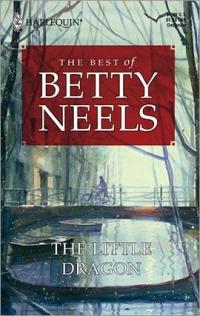 THE TRADWIFE'S SECRET |
 Sunshine, secrets, and swoon-worthy stories—June's featured reads are your perfect summer escape. |

Purchase
Harlequin Special Releases Romance Series Excerpt of The Little Dragon by Betty NeelsIT WAS starting to snow; the feathery flakes fell soundlessly in a kind of slow motion, turning the old- fashioned gabled houses lining the canal into a painting by Pieter de Hoogh. The girl at the window stood quietly, staring down at the people in the streets below as they bustled to and fro over the narrow arched bridge in front of the house, intent on getting home before the weather worsened. She was a pretty girl, small and slim with nut-brown hair and wide grey eyes heavily fringed. Her nose turned up the merest trifle and her mouth was too wide, although it curved enchant-ingly. She looked happy too, which was surprising, for Constantia Morley, twenty-six years old and an orphan for twenty of those years, hadn't a great deal to be happy about. She had been brought up by an aunt, unmarried and straitlaced, who had tried in vain to make Constantia straitlaced too and quite failed; but she had been kind to her niece after her fashion, and educated her well and raised no objection when Constantia evinced a desire to become a nurse. She had died a year after her niece had taken her finals, and because she had overlooked the fact that the will she had made many years earlier held no provision for Constantia, she had left her nothing at all. The modest amount she had left went to various charities, and the house to some distant relation Constantia had never heard of, who, taking possession of it with almost indecent haste, couldn't wait to show Constantia the door. From then on Constantia had lived at the hospital where she worked, on the fringe of London, with plenty of friends with whom to spend her free time but no home or family to visit. But she wasn't sorry for herself; self- pity wasn't going to help her to make her way in life, and if she were lucky one day she would marry and have a family of her own. Indeed, she had had several proposals during the last few years, but although she had liked the proposers well enough, none of them had swept her off her feet, and she wanted to be swept off her feet... By the time she had reached her twenty-sixth birthday she was beginning to wonder if she was expecting too much of life, and egged on by a restlessness she couldn't understand, she gave up her post as Sister on the medical wards, and went into private nursing. She had been told at the time that it wasn't the life for her; she was a good nurse and used to hard work and the pressures of a busy ward; she would be bored. But she hadn't been bored, although she was willing to concede the fact that life wasn't all roses. She had had a variety of patients during the last six months, spending the first few weeks in a Scottish castle miles from anywhere, followed by a mercifully brief period in a remote Welsh cottage with no telephone, a very sick patient and only a deaf old woman for company. Then there had been a wholesale grocer in the Midlands who worried unceasingly about his money, and then a small spoilt girl in Bournemouth and a charming old lady in a London flat. And now here she was in Holland with what she had to admit was the worst patient of the lot. She turned away from the window at last; her sharp eyes had seen Doctor Sperling's Renault coming over the bridge. He would be at the house in a few moments now and she must go down and meet him in the hall. It was one of her patient's little foibles that Constantia should always be waiting for the doctor; she had to wear uniform too, which, when she considered how little nursing there was to do, seemed ridiculous. She suspected that she was a prestige symbol and that her cap and apron were needed to substantiate her patient's boasting. She reached the dark hall just as Nel, the elderly maid, opened the door and the doctor entered. He was a man of middle age, tall and balding and, Constantia had to admit, as fussy as an old woman. He greeted her with a condescension which made her grit her small even teeth, remarked on the in-clemency of the weather: 'It is, after all, the last day of February," he informed her in the manner of someone handing out vital information, and then, divested of his coat and hat: 'You will lead the way to your patient, nurse?" He had said that each day for just over a week and she had answered, just as she had done each time he came, "Of course, Doctor," and led the way upstairs again to her patient's room. Mrs Dowling was lying on a day bed drawn up to the old- fashioned stove. She was a thin woman, made even thinner by the diet she had insisted upon keeping to until it was discovered that she was a diabetic. Her hair was grey, curly and short and her features strong, with a perpetual expression of annoyance upon them. Her voice was loud, penetrating and bossy. She responded to the doctor's greeting with a languid nod and broke at once into complaint. "You really must explain to Nurse, Doctor Sperling, that I am quite capable of compiling my own diet." She didn't look at Constantia as she spoke, indeed she could have been invisible. "And you must do something about my headaches." Doctor Sperling put his fingertips together and looked wise. He said, in almost perfect English: 'Dear lady, your condition, unless controlled by insulin, would be cause of those headaches. You must allow me to guide you in the matter. I will discuss your diet with Nurse and see what alternatives there are to the diet I prescribed. And now you must tell me how you feel today, Mrs Dowling." His patient spoke at some length, her voice grating unpleasantly on Constantia's ear. But she had heard it all before, so she felt justified in allowing her thoughts to wander. Tomorrow, she reflected, she would have the half day Mrs Dowling so grudgingly gave her twice a week. She had glimpsed the town briefly already, now she was going to explore it; its churches, museums, old houses, canals and narrow alleys. After all, she might never have the chance to come to Delft again. She was really very lucky, she could have been up to her eyes on Women's Medical...the Nieuw Kerk first, she decided, and then the Town Hall... Mrs Dowling had paused for breath; Constantia switched her mind back to her present surroundings, and although she wasn't required to speak, looked intelligent. Ten minutes later she was attending Doctor Sperling to the door. The new diet had been discussed, written down and approved by the patient. The insulin doses the doctor had tactfully left until he was alone with Constantia; she listened carefully to his instructions and smiled a goodbye, quite sorry for him because although he was well thought of by his colleagues in the medical profession and had a fashionable practice, he still had to suffer the tiresomeness of patients like Mrs Dowling. And it seemed as though he would have to suffer her for some time yet, for she harboured the notion that her complaint was something she could ignore if she wished, and indeed before the doctor had persuaded her to have a private nurse she had played ducks and drakes with both her diet and her insulin. She hadn't liked the idea of a nurse at first, but after the beginnings of a diabetic coma, luckily nipped in the bud by the doctor, she had changed her views and even got a good deal of satisfaction from having a nurse to look after her. She had a number of friends, hard-faced women like herself who were addicted to bridge and the bullying of those they considered beneath them, and as none of them had had a private nurse at any time, she derived a good deal of satisfaction from Constantia's presence. But not pleasure; she had tried in vain to bully her, but Constantia wasn't to be cowed. She had learned to show an imperturbable front which quite disconcerted her patient, and although she had a nasty temper upon occasion, she kept it well in check. The agency for whom she worked had thought that she might be in Holland for two or three weeks, no longer, but already a week had gone by and if Mrs Dowling was going to insist on doing exactly what she liked about her diet, then Constantia could see that she might be there for very much longer. Given a sensible patient, the diabetes could have been controlled within two weeks, diets worked out and the insulin doses adjusted, so that an occasional visit to the doctor would have been quite sufficient. But Mrs Dowling wasn't sensible, she was also very rich and moreover suffered from the illusion that money would and could smooth her path. Quite why she needed Constantia was a puzzle, and certainly she had said nothing about her leaving. Constantia, who liked to nurse patients who needed all her skill and care, felt impatient when she thought about it — but if she were to go, the chances were that Mrs Dowling would do something silly like eating éclairs for tea and forgetting her insulin, and end up in hospital in a coma. Constantia went back upstairs and spent the next half an hour persuading her patient that Vienne snitczels just wouldn't do for her dinner that evening. "I sometimes wish that I were back in England,' complained Mrs Dowling. "I could go to one of those health hydros where I'm sure my wishes would be carried out." "Well, there's no reason why you shouldn't," said Constantia briskly, "if you want to." Her patient cast her a look of dislike. "When I want your opinion I'll ask for it," she snapped. 'What have you to offer in place of Vienne snitczels?" Constantia was ready with quite a list; Mrs Dowling rejected first one and then the other and then finally, seeing that Constantia had no intention of ordering the snitczels, graciously allowed that Parma ham cut wafer- thin might do very well. Constantia retired to the kitchen to confer with the cook and on the way back again lingered for a moment at a downstairs window. The snow was coming down thickly now and it was almost dark. Across the bridge she could see the shops lighted up; it would be pleasant to wrap up warmly and explore — tomorrow she would do just that. Excerpt from The Little Dragon by Betty Neels |
|
| |||
|
||||



 © 2003-2025
© 2003-2025